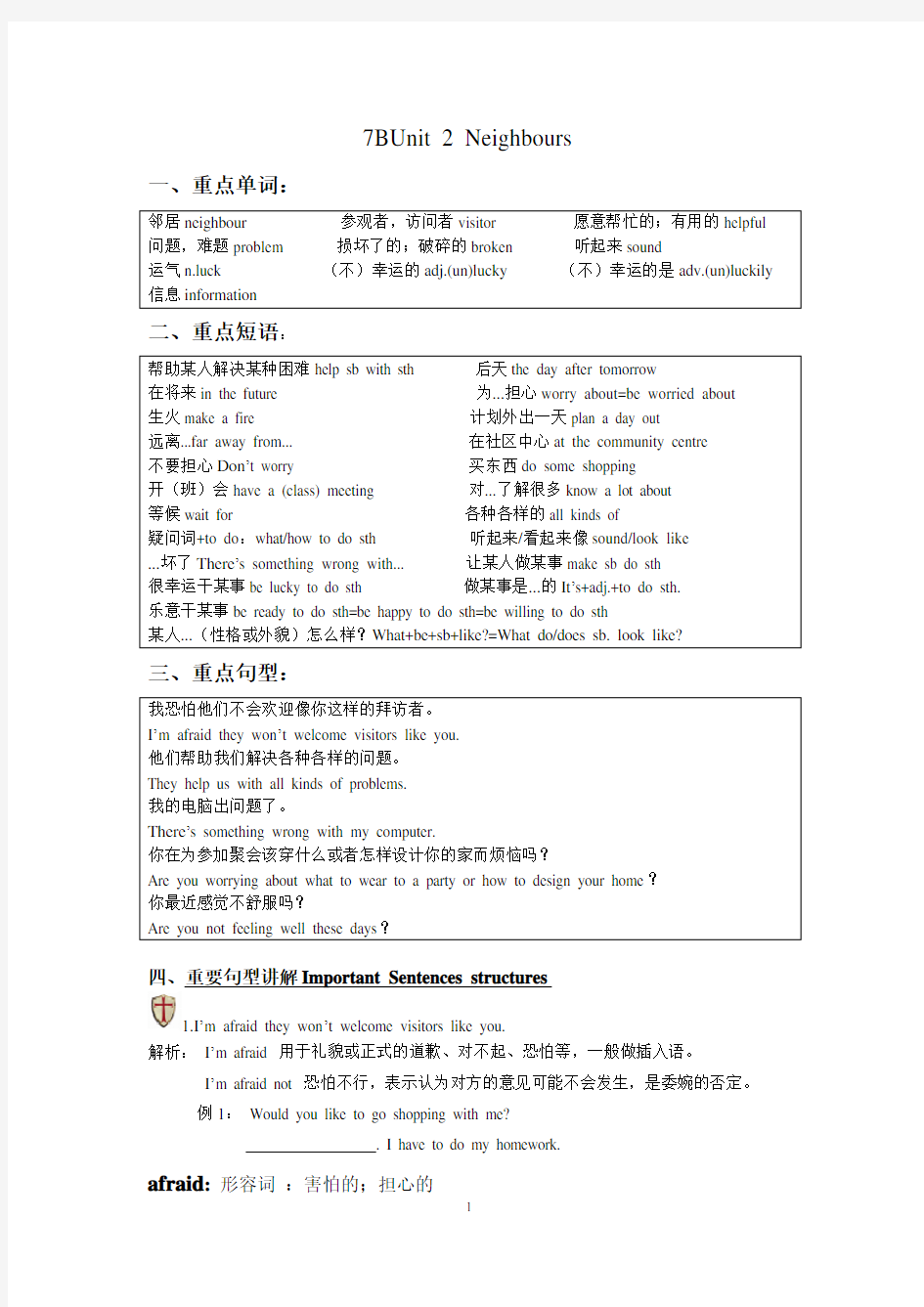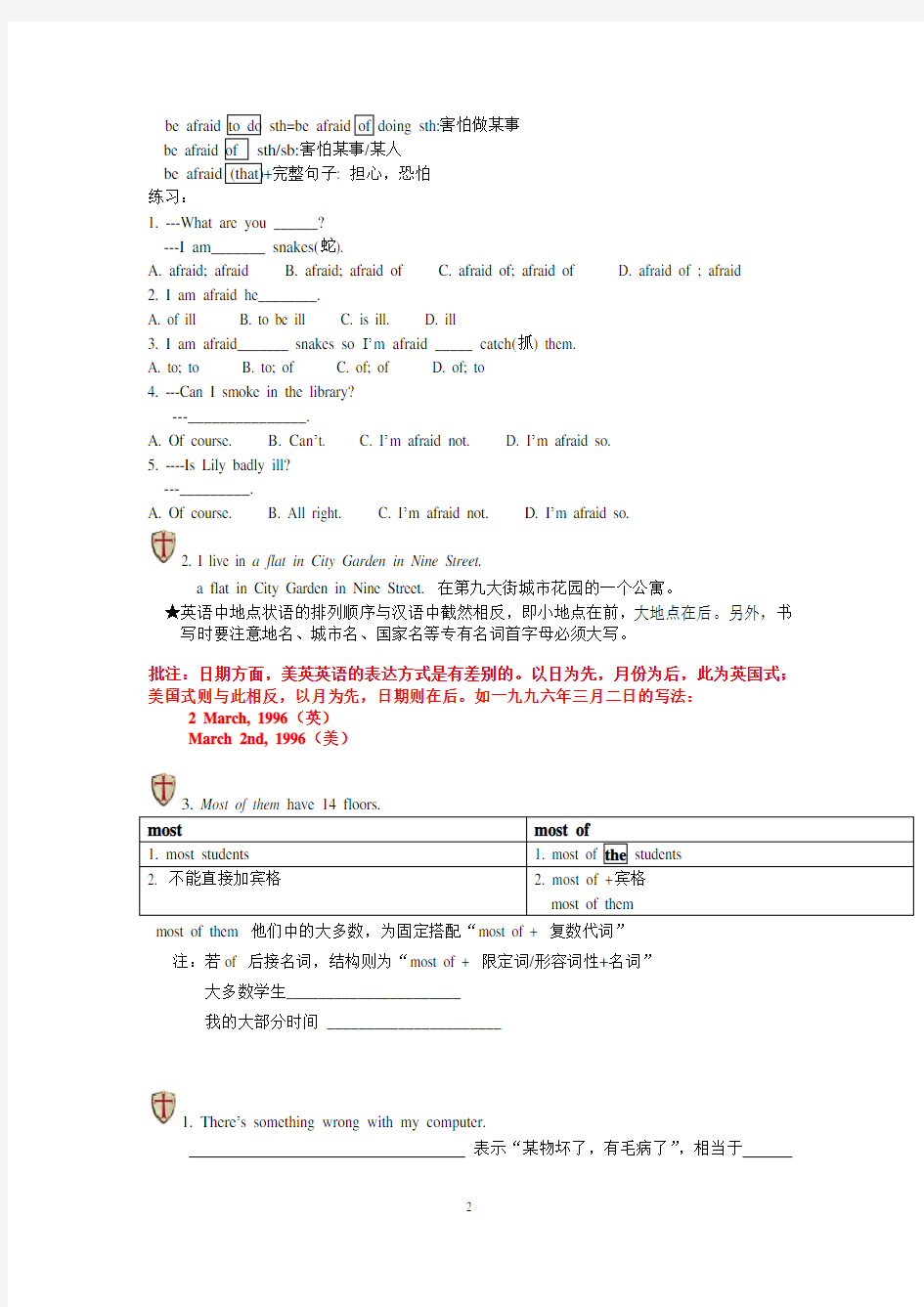七年级下册Unit2 知识点归纳总结


7BUnit 2 Neighbours
一、重点单词:
邻居neighbour 参观者,访问者visitor 愿意帮忙的;有用的helpful 问题,难题problem 损坏了的;破碎的broken 听起来sound
运气n.luck (不)幸运的adj.(un)lucky (不)幸运的是adv.(un)luckily 信息information
二、重点短语:
帮助某人解决某种困难help sb with sth 后天the day after tomorrow
在将来in the future 为...担心worry about=be worried about
生火make a fire 计划外出一天plan a day out
远离...far away from... 在社区中心at the community centre
不要担心Don’t worry 买东西do some shopping
开(班)会have a (class) meeting 对...了解很多know a lot about
等候wait for 各种各样的all kinds of
疑问词+to do:what/how to do sth 听起来/看起来像sound/look like
...坏了There’s something wrong with... 让某人做某事make sb do sth
很幸运干某事be lucky to do sth 做某事是...的It’s+adj.+to do sth.
乐意干某事be ready to do sth=be happy to do sth=be willing to do sth
某人...(性格或外貌)怎么样?What+be+sb+like?=What do/does sb. look like?
三、重点句型:
我恐怕他们不会欢迎像你这样的拜访者。
I’m afraid they won’t welcome visitors like you.
他们帮助我们解决各种各样的问题。
They help us with all kinds of problems.
我的电脑出问题了。
There’s something wrong with my computer.
你在为参加聚会该穿什么或者怎样设计你的家而烦恼吗?
Are you worrying about what to wear to a party or how to design your home?
你最近感觉不舒服吗?
Are you not feeling well these days?
四、重要句型讲解Important Sentences structures
1.I’m afraid they won’t welcome visitors like you.
解析:I’m afraid 用于礼貌或正式的道歉、对不起、恐怕等,一般做插入语。
I’m afraid not 恐怕不行,表示认为对方的意见可能不会发生,是委婉的否定。
例1:Would you like to go shopping with me?
. I have to do my homework.
afraid:形容词:害怕的;担心的
be afraid to do sth=be afraid of doing sth:害怕做某事
be afraid of sth/sb:害怕某事/某人
be afraid (that)+完整句子: 担心,恐怕
练习:
1. ---What are you ______?
---I am_______ snakes(蛇).
A. afraid; afraid
B. afraid; afraid of
C. afraid of; afraid of
D. afraid of ; afraid
2. I am afraid he________.
A. of ill
B. to be ill
C. is ill.
D. ill
3. I am afraid_______ snakes so I’m afraid _____ catch(抓) them.
A. to; to
B. to; of
C. of; of
D. of; to
4. ---Can I smoke in the library?
---_______________.
A. Of course.
B. Can’t.
C. I’m afraid not.
D. I’m afraid so.
5. ----Is Lily badly ill?
---_________.
A. Of course.
B. All right.
C. I’m afraid not.
D. I’m afraid so.
2. I live in a flat in City Garden in Nine Street.
a flat in City Garden in Nine Street. 在第九大街城市花园的一个公寓。
★英语中地点状语的排列顺序与汉语中截然相反,即小地点在前,大地点在后。另外,书写时要注意地名、城市名、国家名等专有名词首字母必须大写。
批注:日期方面,美英英语的表达方式是有差别的。以日为先,月份为后,此为英国式;美国式则与此相反,以月为先,日期则在后。如一九九六年三月二日的写法:
2 March, 1996(英)
March 2nd, 1996(美)
most most of
1. most students 1. most of the students
2. 不能直接加宾格 2. most of +宾格
most of them
most of them 他们中的大多数,为固定搭配“most of + 复数代词”
注:若of 后接名词,结构则为“most of + 限定词/形容词性+名词”
大多数学生______________________
我的大部分时间______________________
1. There’s something wrong with my computer.
表示“某物坏了,有毛病了”,相当于
there is something wrong with ….坏了;出问题了
There is not anything wrong with…
=There is nothing wrong with…
1)坏了:There is something wrong with my bike.
=Something is wrong with my bike.
= My bike is broken.
=My bike doesn’t work.
something/anything/nothing someone/anyone/nobody + 形容词
2)
问:怎么了,出了…问题What’s wrong with you/your car?
例如:我的手表坏了。
_________________________________.
练习:
1)I will find someone to fix my bike. There is ___________ with it.
A. nothing wrong
B. not anything wrong
C. something wrong
D. wrong something
2) Is there__________ in today’s newspaper?
A. new something
B. new anything
C. something new
D. anything new
3) He didn't find ________ in the bushes.
A. anything unusual
B. something unusual
C. nothing unusual
D. unusual anything
4). There is ______in today’s newspaper.
A. important something
B. anything special
C. important anything
D. nothing exciting
5) There is something wrong with my car.(同义句)
__________ is _________ with my bike.
My bike ______ ________.
My bike ______ ________.
6) There is not anything wrong with my car. (同义句)
There is _______ wrong with my car.
________ is wrong with my car.
2. My cousin Annie’s bicycle is broken, so she’s going to ask someone to fix it
someone 不定代词,意为“某人”,表示人,相当于somebody.
注:当someone 等不定代词作主语时,谓语动词要用。
例:我们需要人来修手表。
3. Some colleges students are ready to help.
be ready to do sth 乐于做某事=
为……..做好准备。
例如:李明乐于帮助贫困地区的孩子。
______________________________________________.
晚会一切准备就绪。
____________________________________________.
练习
1. The Maths exam is coming. I am getting ready_______ it.
A. to
B. for
C. with
D. of
2. ---Are you ready_______?
---Yes, I am.
A. running
B. for run
C. to run
D. run
3. She is always willing to help others.(同义句)
She _______ _______ to help others.
4. Some of them often visit the old people and do some shopping for them.
do some shopping 动词短语,意为“买东西”,为固定结构,类似短语:
打扫卫生读些书洗衣服
6. ----What are you going to be in the future?
----I like computers. I’m going to be a computer engineer.
be going to…表示“打算做……”,指打算或计划做某事;be going to be(表示职业的名词),意为“打算当(从事某种职业)的人”
例I’m going to listen to music after school.
典例讲解
1.In order to find ______ better job, she planned to learn ______ second foreign language.
A. the, a
B. a ,a
C. the, the
D. a ,the
2.There are about ten__________ working in the police station.
A. policeman
B. policemen
C. postman
D. postmen
3.----What are you_________ when you grow up in the future?
----An actor. I want to play in films or plays.
A.going to make
B. going to be
C. going to have
D. going to do
4.You need to put on more clothes because the temperature will drop to five degrees ________ (在…之下)zero .
5.The child is too young____________________(生火) to make the room warmer.
6.The __________(生病的)boy wants his mother to give him a delicious cake.
7.The background music sounds____________(noise). Please turn it down.
五.will和be going to构成的一般将来时
概念引入
1.The spaceship will leave the Earth at 9 a. m. 宇宙飞船将在上午9:00离开地球。
2.It’ll take us to the Moon.它将把我们带到月球。
3.When we arrive,I’m going to walk on the Moon.当我们到达时,我将在月球上行走。4.Are the dogs going to come with us? 狗和我们一起来吗?
句1,2含有助动词will,句3,4含有be going to结构,这四句话都是一般将来时。本单元我们主要学习will和be going to构成的一般将来时。
用法讲解
(一)、基本概念
表示将来某个时间要发生的动作或存在的状态,常与一些表示将来的时间状语连用。
例如:今天晚上我将在电视上看一场足球比赛。
(二)、基本结构
一般将来时的结构一般由“”或“”构成。will是助动词,不能独立使用,前面的主语不管是什么人称,其后总用will。在名词或代词后常简缩为’ll,并与主语连写在一起。will的否定形式是will not,缩略形式
是。
(三)、时间状语
一般将来时常用的时间状语:
等。
例如:汤姆两天后回来。
从现在起我会更加小心的。
(四)、基本句型
(1)肯定句
1)主语+will+动词原形+其他
他马上来这儿。
2)主语+be going to+动词原形+其他
我们打算今天下午去爬山。
(2)否定句
1)主语+ will + not + 动词原形+其他
他不去参加聚会。
2)主语+be + not + going to+动词原形+其他
明天他不去做早操。
(3)一般疑问句
1)Will+主语+动词原形+其他?
他会帮助你学习英语吗?
2)Be动词(Am,Is,Are)+主语+going to+动词原形+其他?
你打算明天下午玩电脑游戏吗?
(4)特殊疑问句:疑问词+一般疑问句?
—What will the students have for lunch today? 学生们今天午饭吃什么?
—They will have bread.他们将吃面包。
(五)、注意的问题
(1)主语是第一人称I; we 时,常用助动词shall + 动词原形。否定形式是shall 后加not 构成,shall not可缩写成shan’t。
例如:We shall be very happy if you accept it. 如果你接受了它,我们将会很高兴。
I shall write you a letter next month. 下个月我会给你写信。
We shan’t be in the same room all day. 我们不会整天待在同一房间里。
(2)在问对方是否愿意, 或表示客气的邀请时,常用will。
例如:Will you go to the zoo with me? 你愿意和我去动物园吗?
Will you please open the door? 请打开门好吗?
(3)在表示建议或征求对方意见时,用shall。
例如:Shall we go at ten?我们在10:00走好吗?
(六)、There be句型与含有will和be going to的一般将来时
(1)There be句型与含有will的一般将来时基本结构:There will be +名词+其他成分
例如:There will be only one country in the future. 未来会只有一个国家。
(2)There be句型与含有be going to的一般将来时基本结构:
There is / are going to be +名词+其他成分(注意句型中going to 后面的be不能改为have。) 常用来表示将有某事发生。
例如:There is going to be a football match next Saturday in our school.
下周六我们学校将有一场足球比赛。
注意:无论后面加单数名词或名词的复数形式,be都必须用原形。
(七)、be going to与will 的区别
(1)be going to 表示近期、眼下就要发生的事情,will 表示的将来时间则较远一些。
例如:He is going to write a letter tonight. 今晚他打算写一封信。
He will write a book one day. 有一天他会写一本书。
(2)be going to 表示根据主观判断将来肯定发生的事情,will表示客观上将来势必发生的事情。
例如:I think our team is going to win the game. 我认为我们队会赢得比赛。
He will be twenty years old next year. 明年他就20岁了。
(3)be going to含有“计划,准备”的意思,而will则没有这个意思。
例如:I’m going to spend my holiday in a village. 我打算在一个小村子里度假。
He will be here in half an hour. 他一小时后到达这里。
(4)在有条件从句的主句中,一般不用be going to, 而多用will。
例如:We’ll have a picnic if my father is free. 如果我父亲有空,我们会去野餐。
(5)be going to 表示根据目前迹象推断将要发生的事情,而在没有迹象表明的情况下进行的猜测用“will和be going to”皆可。
例如:Look at the clouds. It’s going to rain. 你看天上的云。快下雨了。
My God! We are going to crash. 天哪!我们快撞车了。
I think the weather will be nice.
I think the weather is going to be nice.我想天会变晴朗的。
